| |||||
| Decades: | |||||
|---|---|---|---|---|---|
| See also: | Other events of 2002 List of years in Georgia (country) | ||||
| |||||
| Decades: | |||||
|---|---|---|---|---|---|
| See also: | Other events of 2002 List of years in Georgia (country) | ||||

Zviad Konstantines dze Gamsakhurdia was a Georgian politician, dissident, scholar, and writer who became the first democratically elected President of Georgia in the post-Soviet era.

Eduard Ambrosis dze Shevardnadze was a Soviet and Georgian politician and diplomat who governed Georgia for several non-consecutive periods from 1972 until his resignation in 2003 and also served as the final Soviet Minister of Foreign Affairs from 1985 to 1990.

United National Movement is a liberal and pro-western political party in Georgia founded by Mikheil Saakashvili which rose to power following the Rose Revolution. Since the 2012 parliamentary election, it is the main opposition party.
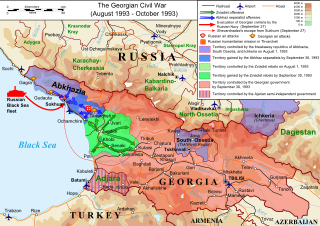
The Georgian Civil War lasted from 1991 to 1993 in the South Caucasian country of Georgia. It consisted of inter-ethnic and international conflicts in the regions of South Ossetia and Abkhazia, as well as the violent military coup d'état against the first democratically-elected President of Georgia, Zviad Gamsakhurdia, and his subsequent uprising in an attempt to regain power.
The Kodori Valley, also known as the Kodori Gorge, is a river valley in Abkhazia, Georgia's breakaway autonomous republic. The valley's upper part, populated by Svans, was the only corner of the post-1993 Abkhazia directly controlled by the central Georgian government, which since 2006 officially styles the area as Upper Abkhazia. On August 12, 2008, Russo–Abkhazian forces gained control of the Upper Kodori Valley, previously controlled by Georgia.

Tengiz Kitovani is a retired Georgian politician and military commander with high-profile involvement in the Georgian Civil War early in the 1990s when he commanded the National Guard of Georgia and served as a Defense Minister until being gradually sidelined by Eduard Shevardnadze who had earlier been invited to lead the nation after a successful coup d'etat launched by Kitovani and his allies against President Zviad Gamsakhurdia.

The Georgian–Ossetian conflict is an ethno-political conflict over Georgia's former autonomous region of South Ossetia, which evolved in 1989 and developed into a war. Despite a declared ceasefire and numerous peace efforts, the conflict remained unresolved. In August 2008, military tensions and clashes between Georgia and South Ossetian separatists erupted into the Russo-Georgian War. Since then, South Ossetia has been under Russian occupation.
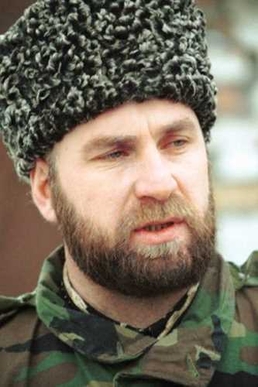
Hamzat (Ruslan) Gelayev (Russian: Хамзат Гелаев; Chechen: ГелагIеран Ӏабдулхьамидан воI Руслан, romanized: Gelaevhervan Abdul-Hamidan vol Ruslan was a prominent commander in the Chechen resistance movement against Russia, in which he played a significant, yet controversial, military and political role in the 1990s and early 2000s. Gelayev was commonly viewed as an abrek and a well-respected, ruthless fighter. His operations spread well beyond the borders of Chechnya and even outside the Russian Federation and into Georgia. He was killed while leading a raid into the Russian Republic of Dagestan in 2004.
The 2006 Kodori crisis erupted in late July 2006 in Abkhazia's Kodori Gorge, when a local militia leader declared his opposition to the Government of Georgia, which sent police forces to disarm the rebels. The upper part of the Kodori Gorge was at that time the only portion of Abkhazia, Georgia's breakaway republic, not controlled by the Abkhaz authorities.

Emzar Kvitsiani is a former Georgian military commander and politician. He took part in the War in Abkhazia (1992–1993), forming a paramilitary group Monadire in the upper Kodori valley, guarding it from Abkhaz forces. He was mainly active in Kodori valley, which he ran de facto through his militia from 1992 to 2006. In 1999, President Eduard Shevardnadze appointed Kvitsiani to the post of President's special envoy to Kodori valley. In 2001, Kvitsiani allegedly cooperated with Chechen field commander Ruslan Gelayev in an attempt to bring Abkhazia back under Georgian control. Kvitsiani opposed the Rose Revolution, which subsequently led to confrontation with the Georgia's central authorities under Mikheil Saakashvili. President Sakaashvili removed him from his official government position in December 2004 and later disbanded the Monadire in April 2005. Kvitsiani declared defiance to the authorities in 2006 and was subsequently ousted by the Georgian government forces. He fled to North Caucasus, but, in 2014, he was arrested on his return to Georgia, initially sentenced to 16 years in jail, and then released under a plea bargain in early 2015. He was one of the leaders of the Alliance of Patriots of Georgia and a member of Parliament of Georgia.
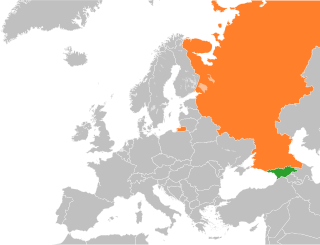
Russia and Georgia have had relations for centuries. The contacts between the two date back to the 15th and 16th centuries, and the most important stage started in 1580s, when Georgian kingdom of Kakheti and Russian Empire signed a treaty of alliance in 1587. Since then, Georgia-Russia relations have been developing vibrantly, and culminated in Treaty of Georgievsk, which established eastern Georgia as a protectorate of Russia. At that time, Georgia saw Russia as a powerful Christian and modernizing neighbor, capable of protecting Georgia from invading Muslim empires and North Caucasian raiders. Although Russia did help Georgia to ward off Lezgin invasions, it failed to protect Georgia when Persia invaded in 1795. Catherine the Great later imposed punitive measures against Persia, but they were cut short by her death. In 1800, Paul signed a proclamation on the incorporation of eastern Georgia into the Russian Empire, which was finalized the following year by Tsar Alexander I. This was followed by annexation by Russia of western Georgian kingdoms and principalities and their incorporation into Russian Empire, namely, Kingdom of Imereti in 1810, Principality of Guria in 1829, Principality of Svaneti in 1858 and Principality of Mingrelia in 1867. Incorporation into the empire ended Muslim invasions and brought peace to Georgia. Russian Empire ended slave trade by Ottomans in western Georgia, which saved Georgia's shrinking population from demographic catastrophe. It also provided Georia with means for a cultural revival, such as Tiflis Imperial Theater, which was opened in 1852 and revitalized Georgia's long-abandoned theatrical tradition. Georgian intellectuals pursued their education in universities of Moscow and Saint Petersburg and brought new ideas to Georgia. However, loss of sovereignty and abolition of the autocephalous status of the Georgian Orthodox Church, along with Russification policy, gave rise to public discontent and rebellions. As a result of Russo-Turkish wars of 1828-1829 and 1877-1878, Russia acquired the historical southern Georgian provinces, such as Adjara and Meskheti from the Ottomans. The unification of historical Georgian lands under Russian Empire and national consolidation of Georgia gave rise to Georgian nationalism, spearheaded by "Tergdaleulebi" movement, a group of Russian-educated Georgian intellectuals led by Ilia Chavchavadze who brought modern nationalist ideas into Georgia. They campaigned against Russification and promoted national identity among Georgians through "Society for the Spreading of Literacy among Georgians" and newspaper Iveria. Their vision did not envisage an outright revolt for independence, but demanded autonomy within the reformed Russian Empire, with greater cultural freedom, promotion of the Georgian language, and support for Georgian educational institutions and the national church. This movement instilled strong sense of national cohesiveness among Georgians, which were divided between various Georgian regional feudal kingdoms and Muslim empires throughout middle ages, and paved the path to the independence, which Georgia regained following the collapse of Russian Empire in 1917. The Menshevik government of Georgia transformed the image of now Bolshevik-led Russia from a source of enlightment into Asiatic state imbued with oriental backwardness and sough ties with the West through its links to Second International. The short-lived Georgian independence ended when Georgia was incorporated in the Soviet Union as the Georgian Soviet Socialist Republic in 1922. The bilateral Russo-Georgian ties were strained again in 1991 due to Moscow's support of separatist regions within Georgia and its intentions to join NATO. Russo-Georgian relations briefly began to improve during the Shevardnadze's presidency, but they became strained again after the Rose Revolution in Georgia. The tensions led to the Russo-Georgian War in August 2008, and diplomatic relations were broken. To this day, the two countries have maintained no formal diplomatic relations since.
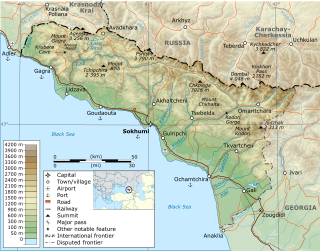
The War in Abkhazia was fought between Georgian government forces for the most part and Abkhaz separatist forces, Russian government armed forces and North Caucasian militants between 1992 and 1993. Ethnic Georgians who lived in Abkhazia fought largely on the side of Georgian government forces. Ethnic Armenians and Russians within Abkhazia's population largely supported the Abkhazians and many fought on their side. The separatists received support from thousands of North Caucasus and Cossack militants and from the Russian Federation forces stationed in and near Abkhazia.
The Battle of Gagra was fought between Georgian forces and the Abkhaz secessionists aided by the Confederation of Mountain Peoples of the Caucasus (CMPC) militants from 1 to 6 October 1992, during the War in Abkhazia. The allies, commanded by the Chechen warlord Shamil Basayev, captured the town of Gagra from the undermanned Georgian forces in a surprise attack, leading to an outbreak of ethnic cleansing of local Georgian population. The battle proved to be one of the bloodiest in the war and is widely considered to be a turning point in the Georgian-Abkhaz conflict. The action, in which Russian commanders were suspected to have aided to the attackers, also resulted in a significant deterioration of the Georgian-Russian relations.
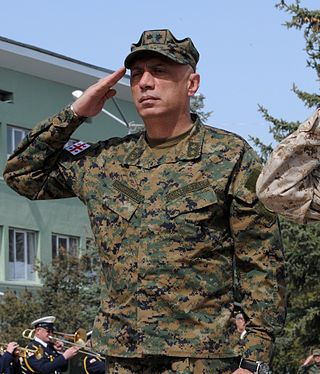
Devi Chankotadze is a Georgian military leader and politician who served as Georgia's Chief of the Joint Staff of the Armed Forces in 2008–2012, and has served as a member of the Parliament since 2020. He carries the rank of Lieutenant General.
The War in Abkhazia from 1992 to 1993 was waged chiefly between Georgian government forces on one side, Russian military forces on other side supporting separatist forces demanding independence of Abkhazia from Georgia. http://www.historyorb.com/russia/georgia.php Ethnic Georgians, who lived in Abkhazia fought largely on the side of Georgian government forces. Ethnic Armenians and Russians within Abkhazia's population, largely supported Abkhazians and many fought on their side. The separatists were supported by thousands of the North Caucasus and Cossack militants and by the Russian Federation forces stationed in and near Abkhazia.

The Pankisi Gorge crisis was a spillover of the Second Chechen War, with military dimension in Georgia early in the 2000s. Georgia was pressured by Russia and the United States to repress the threats of Al-Qaeda in the Pankisi Gorge.

The Lopota incident, known in Georgia as the special operation against an illegal armed group in Lopota, was an armed incident where the Georgian special forces engaged an unknown paramilitary group of about 17 unknown individuals which had allegedly taken several people hostage in the remote Caucasus gorge of Lopota near the border between Georgia and the Russia's Republic of Dagestan.
The following lists events in 2017 in Georgia.